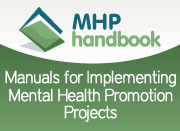Tools
- Utilities:
- Print this page
- Send this page
- Font size:
- Increase font size
- Decrease font size
Newsletter Issue No. 7
12/01/2009 - Submitted by: Tilia Bousios
Publisher: Managing Editor, Richard Wynne, Work Research Centre
Distribution Date: 12/01/2009
The 2nd ProMenPol Policy Workshop
Each year ProMenPol runs a half-day policy workshop in Brussels that follows the Annual Practitioners Conference. The 2008 Policy Workshop is the second of three annual forums which will be run during the lifetime of the project. The workshop took place on the 11th of December 2008 in the premises of KoWi, the EU Liaison Office of German Research Organisations.
The aim of the second ProMenPol policy workshop was to bring to the attention of policy makers the issues raised by practitioners in the Annual Conference held in Berlin during the summer. In Berlin, participants had been introduced to the European Mental Health Pact (EMHP) and asked to raise issues that they would like to be addressed during the second ProMenPol policy workshop.
The policy workshop heard from a number of key speakers who provided a state of the art overview of mental health policy issues within Europe. Guest speakers included Dr. David Gold who was responsible for developing and disseminating the SOLVE programme during his time with the International Labour Organisation, Jurgen Scheftlein, from DG Health and Consumer Protection, and Gregor Henderson who has been assisting a number of national governments to frame their mental health policies.
The views of the participants of the Annual Conference were presented to the workshop by Dr. Richard Wynne (Work Research Centre), Merike Sisask (ERSI) and Prof. Eija Stengard (STAKES). A description of work in progress in the ProMenPol project was provided by Katrin Zardo (BAuA).
The workshop was chaired by Dr. Karl Kuhn (BAuA) who also co-moderated the discussion with Dr. Richard Wynne.
The presentations made at the workshop are now available.
Main Points from the Discussion
The discussions that took place at the workshop ranged widely, but there were two main themes that emerged:
- The role of ProMenPol in the context of the Mental Health Pact (see: http://www.ec-mental-health-process.net for more information)
- The nature of supports that practitioners need to improve their practice
ProMenPol and the Mental Health Pact
There are a number of obvious ways in which ProMenPol can contribute to the development of the Mental Health Pact. These include:
- Given the fact that the ProMenPol website attracts more than 40,000 visitors per month and has almost 500 members, it can help to promote and disseminate the Mental Health Pact amongst its membership and visitors to the site
- The ProMenPol project covers three of the five major areas for action of the pact – schools, workplaces and older people’s residences. In collecting examples of good practice and conducting field trials in each of these settings, it can offer a wealth of experience to all who are interested in promoting the pact
- The ProMenPol aim of bringing policy makers and practitioners closer together provides an obvious means of boosting communications about the pact, sharing ideas and learning from initiatives
There are many difficulties facing the implementation of the Pact. Amongst these is the issue of engaging with stakeholders in each of the settings of interest. There is a need to engage with ‘early adopters’ of mental health promotion if it is to be successful. ProMenPol, through the package of services that it offers and the field trials that it runs offers significant possibilities in this regard.
It was generally agreed that the ProMenPol approach was practical and applied. The next challenge was to make it more relevant to policy makers by providing information about what can be achieved, in what specific areas of policy, based on what evidence. The ProMenPol approach has the potential to bring policy makers in contact with skilled practitioners and by this means to deliver more effective policy formation. Effectively, the ProMenPol partners need to consider how they can place people at the centre of the EMHP and more specifically contribute to the five EMHP thematic events.
ProMenPol and Supports for Practitioners
There were a number of suggestions concerning improvements that might be made to the ProMenPol services that would enhance their effectiveness. These included:
- Providing information about whether tools in the database needed training to be used
- Providing clearer information about the criteria for inclusion of tools that have been included in the database and toolkit
- The website should include descriptions of good practice, especially in relation to practitioners’ usage of tools within the database
- The website should provide users with the opportunity to provide feedback about their experience of tool usage
- It was suggested that ProMenPol should emphasise more worthwhile tools and particularly those which provide basic strategies and which have a broad scope in each setting.
- It was pointed out that even if a practitioner has mental health promotion tools at hand there is no guarantee that they will be implemented. More substantives assistance is required above and beyond the availability of tools. ‘Hand holding’ and support are needed.
- The issue of transition was raised. Transitions are developmental points at which mental health issues often arise, e.g. transition from school to work or from work to retirement. This is a process that is not well addressed by the separation of issues into the three areas of the ProMenPol project nor is it dealt with well in the five thematic seminars organised under the auspices of the EMHP. The overlaps between school, the workplace and older people need to be addressed. Transition tools are included in the ProMenPol database but they are not highlighted as such. This could be resolved by adapting the database.
Evaluating the ProMenPol Database
At present, there are almost 500 people registered as members of the ProMenPol website. Each of these people receives the newsletter from the project and they are also entitled to upload tools on to the ProMenPol database.
Part of the remaining work on the project is concerned with redesigning the ProMenPol database and toolkit so that it is less complex and more usable for practitioners. Given that these are new and innovative products, the first version of them were designed to cover all eventualities, in the full knowledge that the structures, search facilities and the coding systems used were over inclusive. Given that there is now a body of experience of using the database and toolbox over the past 12 months or so amongst both project team members and registered project members, it is now time to evaluate their experience of using these products.
In order to achieve this end, the ProMenPol project has asked its external evaluator, Mr. John Griffiths from a Welsh company called Work2Health to undertake a survey of the experiences of the registered members during the months of January. This is a short survey, which will focus on the usability of the database and tools and the website in general, and will also provide respondents with the opportunity to suggest improvements to them.
You will receive an e-mail from John over the coming days together with a questionnaire. We would ask you to complete a questionnaire and return it to John at the e-mail address that will be provided before the end of January. The information that you provide will be invaluable in supporting our efforts to improve the database and toolkit and the entire website.



